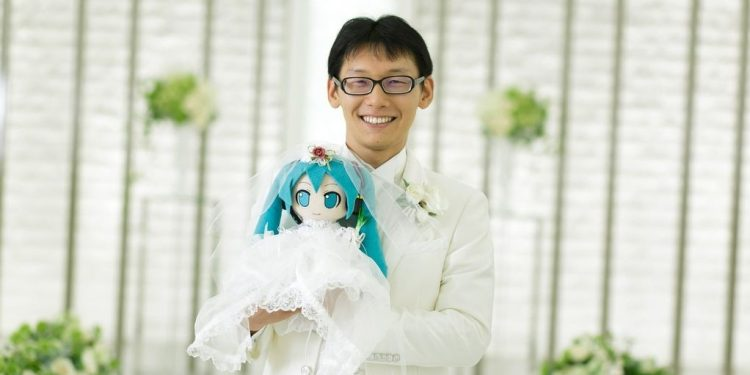Akihiko Kondo, a 41-year-old Japanese man, celebrated his sixth wedding anniversary with his virtual wife, Hatsune Miku, on November 4. Kondo’s unique story of love, resilience, and acceptance has captured international attention, challenging societal norms about relationships and the concept of fictosexuality.
The Genesis of an Unconventional Love Story
Akihiko Kondo first encountered Hatsune Miku, a virtual vocaloid character, in 2007, shortly after her release. Created as a singing voice synthesizer software, Miku, whose name translates to “the first sound of the future,” became immensely popular in Japan and across the globe. With her soothing voice and distinct anime-like persona, Miku transcended her digital origins to become a cultural icon.
Akihiko Kondo was captivated by her charm during a particularly difficult phase of his life. Struggling with workplace bullying and the subsequent mental health challenges, including an adjustment disorder, Kondo found solace in Miku’s voice.
Read : Bizarre No-Clothes Wedding Ceremony Took Place in Hedonism III Resort of Jamaica
Her presence became a source of comfort, helping him reconnect with the world around him. By 2018, his affection had blossomed into a deep emotional attachment, leading to their wedding ceremony held at a chapel in Tokyo.
The Celebration of a Unique Bond
Six years after their wedding, Akihiko Kondo took to Instagram to commemorate their anniversary with heartfelt posts. Sharing pictures of their celebration, including an anniversary cake adorned with the words “I like Miku very much. Happy six-year anniversary,” Kondo expressed his unwavering love and gratitude for Miku.
For Kondo, Miku represents more than just a fictional character—she is his partner in every sense. Their marriage, though unconventional, symbolizes his ability to find happiness and stability in a form that defies traditional norms.
Speaking to The Mainichi Shimbun, Kondo revealed that he had experienced romantic feelings for real women in the past but faced societal challenges that made it difficult for him to maintain such relationships.

Miku’s constant, non-judgmental presence has been a pillar of strength for Kondo. In a world where human relationships often come with complexities and expectations, his bond with Miku offers him unconditional support.
Understanding Fictosexuality and Its Broader Implications
Kondo’s journey has also shed light on the concept of fictosexuality, a term describing individuals who are romantically or sexually attracted to fictional characters. While this identity may seem unusual to many, it has provided a sense of belonging to people who form meaningful connections outside the realm of traditional human relationships.
Fictosexuality challenges the boundaries of what society deems acceptable in relationships. It raises important questions about love, connection, and companionship in the modern age, especially as technology continues to blur the lines between the virtual and physical worlds.
Kondo’s story has inspired mixed reactions. While some celebrate his courage to live authentically, others question the legitimacy of such unions. Regardless of the controversy, his narrative underscores the importance of mental health, self-acceptance, and the need for society to embrace diverse expressions of love.

As we navigate a rapidly evolving world, stories like Kondo’s encourage us to reflect on the nature of human relationships and the role of technology in shaping our connections.
Kondo’s marriage to Hatsune Miku also highlights the evolving landscape of relationships in a technology-driven era. As virtual and augmented realities become more sophisticated, the boundaries between human and digital connections continue to blur.
For individuals like Kondo, virtual relationships offer an alternative form of companionship that fulfills emotional needs without the challenges of traditional relationships. His story invites us to rethink the essence of love and connection, demonstrating that these feelings are deeply personal and can manifest in diverse, unconventional ways.

